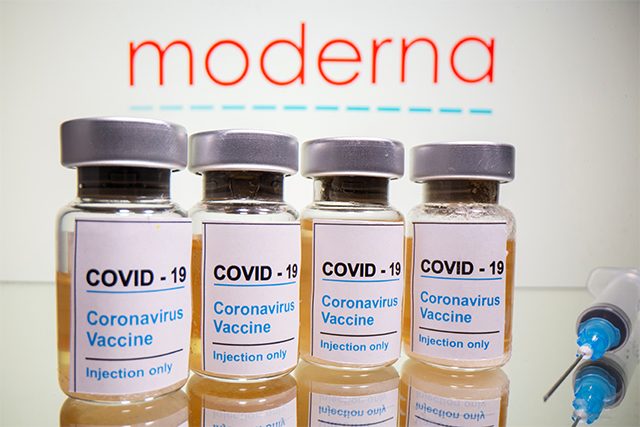
Moderna Inc said on Monday its experimental vaccine was 94.5% effective in preventing COVID-19 based on interim data from a late-stage clinical trial, becoming the second U.S. company in a week to report results that far exceed expectations.
Following are reactions to the news.
Eleanor Riley, Professor of Immunology and Infectious Disease at the University Of Edinburgh
“Although the numbers are small, this trial also gives an indication that vaccination is effective in older and BAME individuals and prevents severe disease, all of which are key to allowing the world to start opening up again. The absolute prerequisite for a COVID-19 vaccine is that it stops people becoming ill enough to require hospital treatment and stops people dying. The preliminary data reported here suggest that this vaccine – and by extension, the Pfizer/BioNtech vaccine – will achieve this goal.
“The safety data also look promising. The side effects of vaccination appear to be in line with those typically seen for other adult vaccinations, including the seasonal influenza vaccination which is administered in many millions of doses every year.
“One important unknown is whether this vaccine, or any of the vaccines currently in trials, prevents disease transmission. It is likely that vaccines that prevent symptomatic disease will reduce the duration and level of infectiousness, and thus reduce transmission, but we don’t yet know if this effect will be large enough to make any meaningful difference to the spread of the virus within communities.
“But, overall, this is excellent news. Having more than one source of an effective vaccine will increase the global supply and, with luck, help us all to get back to something like normal sometime in 2021.”
Prof Trudie Lang, Director, The Global Health Network, Nuffield Department of Medicine, University of Oxford
“It is very good news indeed to see another vaccine coming through with similar efficacy results as were reported last week from Pfizer. This is also an interim analysis, which means that there were enough cases within the vaccinated volunteers to give statistical significance and allow the team to break the blind to determine who had the active vaccine and who had placebo.
“Here they found that of 95 cases of COVID, 90 had received the placebo and five the active vaccine. These early results suggest that there was a representation across different age groups and diverse communities in the protected group. This is really encouraging and it further demonstrates that a vaccine for COVID is a real probability and that having more than one supplier should help assure better and more equitable global availability.
“This vaccine is also an mRNA vaccine, so many of the same questions remain as we have been discussing with the Pfizer vaccine and these will be looked at carefully by the regulators.”
Stephen Evans, Professor of Pharmacoepidemiology, London School of Hygiene & Tropical Medicine
“This announcement from Moderna is a further encouragement that vaccines will be found to not only have an acceptable efficacy, but an efficacy that is much greater than we had anticipated. This press release is more specific than that of others, in that it confirms the numbers in each group, which was able to be guessed at but to have it confirmed is helpful.
“The range of minor adverse effects reported are unsurprising and typical of almost any vaccine. These reactions tend to be local to where the injection was given and are rarely long-lasting or severe.
“Although they reported efficacy being over 94%, there is statistical uncertainty in this; but based on these data, the likely efficacy will be better than 85% which would be greater than most scientists would have expected.
“This is the first study to report on severe cases and, while uncertainty remains, the finding of no severe cases with the vaccine and 11 cases with placebo is very strong evidence that the vaccine prevents severe as well as mild disease. It is likely that convincing evidence in respect to deaths will probably only be obtained when the vaccine is in use.
“A wide range of people with illnesses and from minority groups were included in the trials as well as substantial numbers of older patients. We will need much more data and a full report or publication to see if the benefit is consistent across all groups, notably the elderly, but this is definitely encouraging progress.”
Peter Openshaw, Professor of Experimental Medicine at Imperial College London
“This news from Moderna is tremendously exciting and considerably boosts optimism that we will have a choice of good vaccines in the next few months.”
“This latest press release is based on a study of 30,000 U.S. adults, including many high-risk or elderly persons. This gives us confidence that the results are relevant in the people who are most at risk of COVID-19 and in most need of the vaccines.”
“Moderna have also announced that the vaccine can be kept in a conventional freezer (-20 degrees Celsius) for up to 6 months, and that once thawed the vaccine can be kept for up to 30 days at standard refrigerator (2 to 8 degrees centigrade). This makes the vaccine much easier to deliver.
“In terms of side effects, news is also quite good. The first dose caused injection site pain in about 3% of people; the second dose was associated with transient generalized symptoms in about 10% of people with fatigue, muscle aches and flu like symptoms. This seems to indicate that they got the dose about right with acceptable adverse events. These effects are what we would expect with a vaccine that is working and inducing a good immune response.”
“We need more complete details than we have in this press release, but this announcement adds to the general feeling of optimism about vaccines for Covid-19. What we still don’t know is how long any protective immunity may last. For that, we will need to wait.” —Reporting by Josephine Mason









